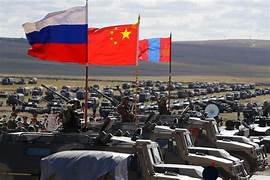In a significant turn of events that has reverberated across the realm of international relations, recent reports have emerged suggesting that China stands ready to step in should there be any act of aggression by the United States or NATO towards Russia. This revelation comes at a time of heightened tensions and complex diplomatic maneuvers on the global stage, raising questions about the potential ramifications of such a stance.
The genesis of this reported readiness stems from longstanding strategic partnerships between China and Russia, characterized by mutual interests in countering what they perceive as Western hegemony and preserving their respective spheres of influence. These ties have only deepened in recent years, bolstered by shared economic goals, military cooperation, and alignment on key international issues.
At the core of this emerging narrative is the principle of collective security and the notion of a multipolar world order, where major powers like China and Russia seek to balance against perceived threats from the West. The specter of NATO expansion, ongoing disputes over territorial claims, and the broader geopolitical chessboard have all contributed to an environment where alliances and allegiances are scrutinized and potentially reshaped.
The prospect of China stepping in to support Russia in the face of external aggression raises several critical considerations and potential implications. Firstly, it underscores the shifting dynamics of global power and the recalibration of traditional alliances. While Cold War-era alliances may have been more rigid and predictable, the modern geopolitical landscape is marked by fluidity and strategic maneuvering, where unexpected partnerships can emerge based on shared interests and perceived threats.
Secondly, such a scenario could have far-reaching consequences for international security and stability. The prospect of a major power conflict, even if indirect or through proxy engagements, carries significant risks of escalation and unintended consequences. The intricate web of alliances, military capabilities, and strategic calculations makes any potential conflict scenario a cause for concern among policymakers and observers alike.
Moreover, China’s hypothetical intervention in support of Russia raises questions about the broader implications for global governance and the rules-based international order. As two permanent United Nations Security Council members, China and Russia wield considerable influence over international affairs. Their actions and responses to geopolitical crises set precedents and shape norms that reverberate globally.
In terms of practical considerations, China’s potential intervention could manifest in various forms, ranging from diplomatic support and political alignment to more tangible military assistance. The specifics of such support would depend on the nature and scale of the perceived threat or aggression against Russia. However, any overt or covert involvement by China in a conflict involving Russia and Western powers would undoubtedly have profound ramifications.
Furthermore, the reported readiness of China to intervene in defense of Russia highlights the complexities of managing competing interests and maintaining strategic equilibrium in an increasingly interconnected world. It underscores the need for robust diplomacy, crisis management mechanisms, and avenues for de-escalation to prevent conflicts from spiraling out of control.
The reports indicating China’s preparedness to intervene should the United States or NATO initiate an attack against Russia signify a notable evolution in global geopolitics. However, they also underscore the intricate power dynamics at play and the possible repercussions of errors or misjudgments in international affairs. As the world watches these dynamics unfold, the imperative for constructive dialogue, conflict resolution, and moral engagement remains more critical than ever.




